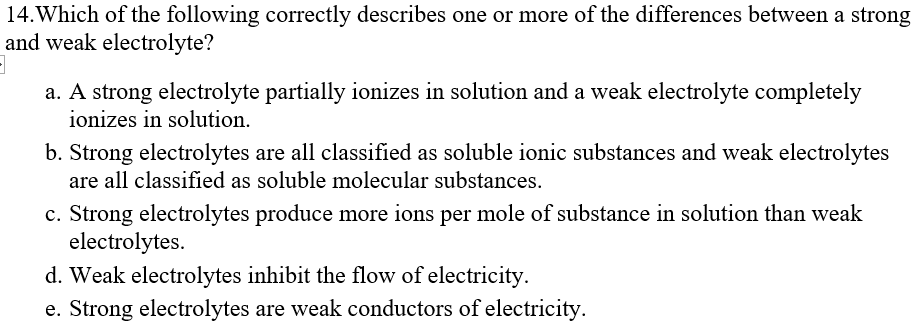14. Which of the following correctly describes one or more of the differences between a strong and weak electrolyte? a. A strong electrolyte partially ionizes in solution and a weak electrolyte completely ionizes in solution. b. Strong electrolytes are all classified as soluble ionic substances and weak electrolytes are all classified as soluble molecular substances. c. Strong electrolytes produce more ions per mole of substance in solution than weak electrolytes. d. Weak electrolytes inhibit the flow of electricity. e. Strong electrolytes are weak conductors of electricity.
14. Which of the following correctly describes one or more of the differences between a strong and weak electrolyte? a. A strong electrolyte partially ionizes in solution and a weak electrolyte completely ionizes in solution. b. Strong electrolytes are all classified as soluble ionic substances and weak electrolytes are all classified as soluble molecular substances. c. Strong electrolytes produce more ions per mole of substance in solution than weak electrolytes. d. Weak electrolytes inhibit the flow of electricity. e. Strong electrolytes are weak conductors of electricity.
Chemistry
10th Edition
ISBN:9781305957404
Author:Steven S. Zumdahl, Susan A. Zumdahl, Donald J. DeCoste
Publisher:Steven S. Zumdahl, Susan A. Zumdahl, Donald J. DeCoste
Chapter4: Types Of Chemical Reactions And Solution Stoichiometry
Section: Chapter Questions
Problem 19Q
Related questions
Question

Transcribed Image Text:14. Which of the following correctly describes one or more of the differences between a strong
and weak electrolyte?
a. A strong electrolyte partially ionizes in solution and a weak electrolyte completely
ionizes in solution.
b. Strong electrolytes are all classified as soluble ionic substances and weak electrolytes
are all classified as soluble molecular substances.
c. Strong electrolytes produce more ions per mole of substance in solution than weak
electrolytes.
d. Weak electrolytes inhibit the flow of electricity.
e. Strong electrolytes are weak conductors of electricity.
Expert Solution
This question has been solved!
Explore an expertly crafted, step-by-step solution for a thorough understanding of key concepts.
This is a popular solution!
Trending now
This is a popular solution!
Step by step
Solved in 5 steps

Recommended textbooks for you

Chemistry
Chemistry
ISBN:
9781305957404
Author:
Steven S. Zumdahl, Susan A. Zumdahl, Donald J. DeCoste
Publisher:
Cengage Learning


Chemistry: An Atoms First Approach
Chemistry
ISBN:
9781305079243
Author:
Steven S. Zumdahl, Susan A. Zumdahl
Publisher:
Cengage Learning

Chemistry
Chemistry
ISBN:
9781305957404
Author:
Steven S. Zumdahl, Susan A. Zumdahl, Donald J. DeCoste
Publisher:
Cengage Learning


Chemistry: An Atoms First Approach
Chemistry
ISBN:
9781305079243
Author:
Steven S. Zumdahl, Susan A. Zumdahl
Publisher:
Cengage Learning

Introductory Chemistry: A Foundation
Chemistry
ISBN:
9781337399425
Author:
Steven S. Zumdahl, Donald J. DeCoste
Publisher:
Cengage Learning

World of Chemistry, 3rd edition
Chemistry
ISBN:
9781133109655
Author:
Steven S. Zumdahl, Susan L. Zumdahl, Donald J. DeCoste
Publisher:
Brooks / Cole / Cengage Learning

Introductory Chemistry: An Active Learning Approa…
Chemistry
ISBN:
9781305079250
Author:
Mark S. Cracolice, Ed Peters
Publisher:
Cengage Learning